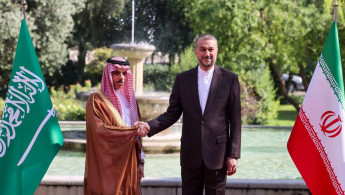Breadcrumb
Iran, Saudi Arabia move further toward reconciliation
Iran and Saudi Arabia took a further step Saturday to seal their reconciliation as Riyadh's top diplomat made a landmark visit to the Islamic republic following a seven-year rupture.
Saudi Foreign Minister Faisal bin Farhan held talks with his Iranian counterpart Hossein Amir-Abdollahian focusing on regional security.
He later met with Iranian President Ebrahim Raisi, and was due to hand him an invitation "to visit the kingdom soon".
Sunni Muslim power Saudi Arabia severed relations with Shia-led Iran in 2016 after its embassy in Tehran and consulate in the northwestern city of Mashhad were attacked during protests over Riyadh's execution of Shia cleric Nimr al-Nimr
But the two countries agreed in March to mend ties and reopen their respective embassies, in a Chinese-brokered deal that has shifted regional relations.
On June 6, Iran reopened its embassy and consulate in Saudi Arabia and the kingdom is expected to reopen its diplomatic mission in Tehran "soon", Prince Faisal said.
"I would like to point out the importance of cooperation between our two countries concerning the regional security, especially the security of maritime navigation and waterways," Prince Faisal said at a joint news conference with Amir-Abdollahian.
The Iranian foreign minister told reporters they had discussed ways of bolstering cooperation in the fields of security, economy, tourism and transportation.
But Amir-Abdollahian stressed Iran's view that "regional security will be ensured by regional actors only" without external interference.
"Our relations are based on a clear foundation of full and mutual respect for independence, sovereignty and non-interference in internal affairs," Prince Faisal added.
He later met Raisi and they "reviewed bilateral relations and ways to enhance and develop them in various fields", the Saudi foreign ministry said in a tweet.
Raisi, in a statement from his office, said there were "no obstacles" to developing ties with Muslim countries, stressing that "regional problems and troubles can be dealt with" through cooperation and dialogue "without foreign interference".
Prince Faisal was the first Saudi foreign minister to visit Iran since 2006 when the late Saudi top diplomat Prince Saudi al-Faisal made a trip to Tehran.
Since restoring ties, Saudi Arabia has pushed for a peace deal with Iran-backed Huthi rebels and also championed the return last month of key Iran ally Syria to the Arab fold.
Saturday's meeting between the Saudi and Iranian foreign ministers was not the first for the two top diplomats.
Prince Faisal and Amir-Abdollahian had met in Beijing in April, where they both vowed to promote regional security and stability.
The same month, a Saudi delegation visited Iran to discuss reopening its diplomatic missions, Riyadh's foreign ministry said at the time.
While Iran reopened its embassy in Saudi Arabia, the reopening of the Saudi embassy in Tehran has been delayed due to the poor condition of the building which was damaged during the 2016 protests.
Pending the completion of the work, Saudi diplomats will be working from a luxury hotel in Tehran, according to media reports.
After the landmark deal with the Saudi kingdom, Iran has moved to cementing or restoring ties with neighbouring Arab countries.
In April, Iran named an ambassador to the United Arab Emirates nearly eight years after his predecessor left.
The move came after Iran welcomed an Emirati ambassador last September ending a six-year absence after the UAE had cut the level of its diplomatic representation in 2016.
Iran has also said it would welcome restoring diplomatic ties with Bahrain to end a seven-year rupture.
And at the end of May, Iran's supreme leader Ayatollah Ali Khamenei said he would welcome a resumption of relations with Egypt which have been cut since the 1979 Islamic revolution.






![Anthony Blinken speech [Getty] Anthony Blinken speech [Getty]](/sites/default/files/styles/image_684x385/public/media/images/6263436E-8ACD-4D3C-9055-25A7BE79DD5A.jpg?h=d1cb525d&itok=fLHmHCRG)
 Follow the Middle East's top stories in English at The New Arab on Google News
Follow the Middle East's top stories in English at The New Arab on Google News
![Gaza death toll [Getty]](/sites/default/files/styles/image_330x185/public/2192491071.jpeg?h=a5f2f23a&itok=1V9vL9X5)
![Koutoubia Mosque, Marrakech [Getty/file photo]](/sites/default/files/styles/image_330x185/public/599585491.jpeg?h=ccb8d0fb&itok=Ov05vBAW)
![Italy FM Tajani [Getty]](/sites/default/files/styles/image_330x185/public/2192496012.jpeg?h=a5f2f23a&itok=W1iS7P4X)